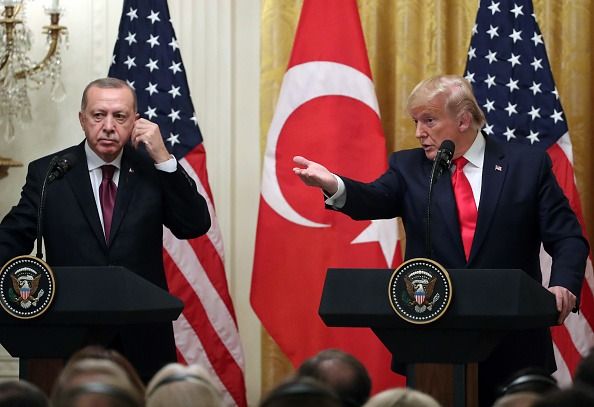Taking Erdogan’s critique of the Nuclear Non-Proliferation Treaty seriously
By Victor Gilinsky, Henry Sokolski | November 14, 2019
 US President Donald Trump and Turkish President Recep Tayyip Erdogan in a joint news conference at the White House this week. (Photo by Mark Wilson/Getty Images)
US President Donald Trump and Turkish President Recep Tayyip Erdogan in a joint news conference at the White House this week. (Photo by Mark Wilson/Getty Images)
Over the years, the Nuclear Non-Proliferation Treaty (NPT) has taken heavy fire both from enemies and friends, but recently there has been nothing so sharp as the criticism that Turkish President Recep Erdogan delivered September 24 in a UN General Assembly speech. It deserves much more attention than it got because it reflects a continued loss of respect, on the part of key NPT-member states, for the treaty’s no-nuclear-weapons pledge.
Erdogan’s speech, mainly focused on Syria, began with an impassioned criticism of the existing world order, specifically the exaltation of the five states that, by virtue of possessing nuclear weapons, have in his view an outsize role in determining “the fate of humanity.” He stretched out the fingers of his right hand and, to wide applause from the General Assembly, said, “The world is bigger than five.”
The inequality between states with nuclear weapons and those without, Erdogan argued, was a principal factor in undermining the international balance. Those with weapons of mass destruction abuse their privileged status by using it to gain leverage in crises. This, he said, violates principles of justice and equality: “Nuclear [military] power should be forbidden for all or should be permissible for all.”
It is not the first time that Erdogan has said it was intolerable that others have nuclear weapons, and Turkey does not. While he makes the point generally, he is surely thinking of the Middle East, where Israel has a nuclear weapons monopoly, and Turkey is constrained by its NPT pledge.
One could pass off his complaints as those of a would-be dictator deluded by visions of Turkey’s grandeur—he built himself a 1,000-room palace, after all—and obsessed with becoming the leader of the Muslim world. But whatever his faults, Erdogan is a serious person. He laid out in his speech what he wanted in Syria, and weeks later he sent his army in to take it. Of course, Turkey is only just constructing its first nuclear power reactors—but we should not underestimate Turkey’s industrial abilities once engaged. And we should not take Erdogan’s criticism of the NPT arrangement as idle talk.
To understand how fast things are changing, recall the shock that accompanied Saudi Crown Prince Mohammed bin Salman’s 2018 announcement that his country would rapidly get the bomb if Iran did. But the predicate for Saudi action was still narrow. Erdogan goes much further; he attacks the foundation of the NPT.
One cannot recall another national leader of a country that signed the NPT’s no-nuclear-weapons pledge who insisted publicly on the right to have the Bomb if any other countries have it. Surely other leaders thought the same, but considered it unacceptable to say so in public, and this restraint helped to protect the treaty.
The hypocrisies of the leading countries have not helped temper dissatisfaction with the NPT. A good example is the sweet deal the Bush administration gave India—essentially full access to the nuclear fuel and equipment market—despite India’s fierce opposition to the NPT from the beginning. The United States then pressured other suppliers to extend India the same generous terms, which, by reasonable lights, should not have been extended to any country outside the treaty.
But nowhere is the hypocrisy of the five NPT-recognized nuclear weapons countries on greater display than in relations with Israel. Despite Israel’s nuclear delivery triad of US-supplied airplanes, French-designed rockets, and German-supplied submarines, the pretense continues that no one knows anything about Israeli nuclear weapons. The United States uses its Security Council veto and diplomatic muscle to shut down any inquiry into Israel’s nuclear activities. Is it surprising that countries such as Turkey, living in the shadow of those weapons, lose respect for US protestations about its devotion to the principles of the NPT?
None of the nuclear powers shows any interest in negotiating an end to its own nuclear weapons. The countries that have them cling to them because of their potency, but also because of the status they confer. Instead of being a vehicle for the eventual elimination of the weapons, the NPT has become—or many countries see it as—a means for perpetuating the division between those that have them and those that don’t.
Most countries don’t seek nuclear weapons, but a significant handful of NPT members, worried about coping with existing or potential nuclear-armed neighbors, have begun to contemplate nuclear weapon status. Battered and weak as it is, and lacking any enforcement mechanism, the NPT, nevertheless has a certain hard-to-define political significance in restraining members’ nuclear weapon ambitions, and it deserves strong support. For one thing, a country’s membership allows internal political forces opposed to nuclear weapons to operate and make their weight felt. You can see this in nuclear-capable countries like Japan and South Korea. And the presence of International Atomic Energy Agency inspectors is important, too, and would be lost in most cases in the event of collapse of the treaty, which could happen after some number of withdrawals.
Although the NPT has exhibited a surprising resilience, it cannot hang together indefinitely if it loses respect. However questionable his motives, Erdogan is not wrong when he says that the NPT reflects the state of affairs a half century ago (and as regards the UN Security Council, that of three-quarters of a century ago), and that the treaty needs renewal. He and other leaders are not going to let go of this belief. An important element of NPT renewal is restoring the treaty’s stated goal—eliminating nuclear weapons—and thereby restoring respect for the treaty among the non-nuclear weapon countries that increasingly press the boundaries of their non-nuclear status.
In truth, it is difficult to imagine progress on nuclear disarmament in the immediate future. Still, the goal has to amount to more than the empty words that express it now. However slowly, the international community needs to begin moving in the right direction, which it is not doing today.
A good place to start is the Middle East, where one country, Israel, has nuclear weapons, and three—Iran, Saudi Arabia, and Turkey—are in the “potential” category. In October 2018 the UN General Assembly voted to convene a conference on the establishment of a Middle East zone free of nuclear weapons and other weapons of mass destruction. It will take place in New York, on November 18 to November 22. Although many countries abstained during the vote, only one country, Micronesia, joined Israel and the United States to oppose convening a conference. The US representative told the General Assembly that in the “absence of the participation of all regional states” (that is, in view of Israel’s declared nonparticipation), the US government “will not attend the conference, and it will view any outcome as illegitimate.”
Maybe it’s time for the United States to show a little respect to the opinion of mankind and at least go and listen.
Together, we make the world safer.
The Bulletin elevates expert voices above the noise. But as an independent nonprofit organization, our operations depend on the support of readers like you. Help us continue to deliver quality journalism that holds leaders accountable. Your support of our work at any level is important. In return, we promise our coverage will be understandable, influential, vigilant, solution-oriented, and fair-minded. Together we can make a difference.
Keywords: NPT, Turkey, nonproliferation, nuclear weapons
Topics: Analysis, Nuclear Energy, Nuclear Weapons
















